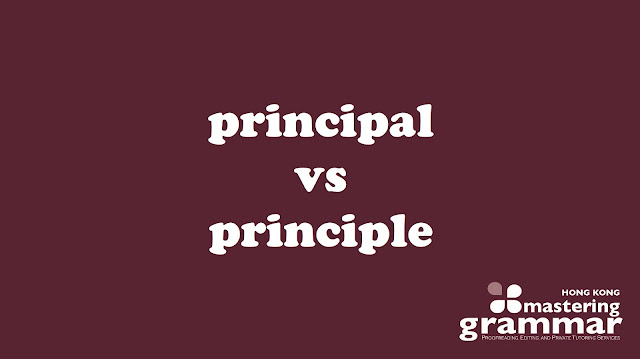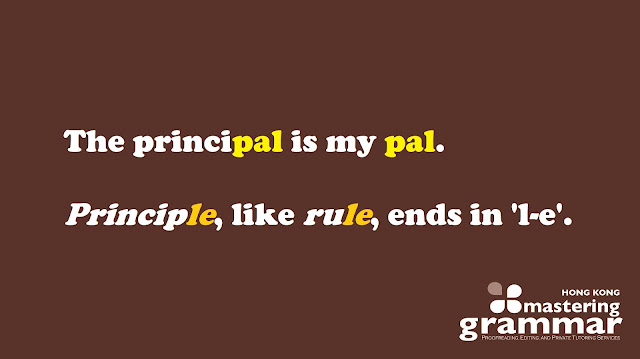Principal vs Principle: Understanding the Difference
It is easy to confuse principal with principle because they are homophones (both are pronounced /ˈprɪnsəpl/ or /ˈprɪnsɪpl/). Homophones are words that sound the same but are spelt differently.
What Does Principal Mean?
Principal can be either an adjective or a noun.
As an adjective, it means 'main' or 'most important':
✅ Teaching is my principal source of income.
✅ The company's principal focus is on customer satisfaction.
As a noun, it refers to the person in charge of a school or college:
✅ Who is the principal of King's College?
✅ The principal has approved our proposal.
In finance and accounting, the term principal is used to refer to the original sum of money borrowed or invested, on which interest or returns are calculated:
✅ After making monthly payments for several years, Chris finally paid off the principal on his mortgage.
✅ The investors received a fixed percentage of the principal as returns on their investment.
What Does Principle Mean?
Principle is a noun that means 'a basic rule' or 'a belief about what is right or wrong':
✅ We learnt the basic principles of car maintenance.
✅ Lying is against my principles.
Tips for Remembering the Difference between Principal and Principle
The first mnemonic above serves to remind you that principal can refer to an actual person, who may be your friend. Use the same word as a describing word to mean something like 'main' or 'chief'.
I hope you have found this content helpful in your English learning journey. If so, please consider buying me a coffee. Your support keeps this blog running and is greatly appreciated!
Examples from the Media
White House officials say they have no evidence to suggest anything nefarious or criminal is in the works, and that their principal focus for now is clearing the border blockades. —Toronto Star (2022)
Principals in Virginia's Loudoun County Public School District, near Washington D.C., have been given a step-by-step guide to help them apply for a warrant from a magistrate should any student try to enter school without wearing a mask. —Daily Mail (2022)
A national campaign should be launched to educate people in the basic principles of parenting, a government-commissioned review concludes today. —The Guardian (2011)
To help Hong Kong's younger generation develop strong moral principles, RTHK has produced a TV series called Ethics Education which is intended to be educational as well as entertaining. —South China Morning Post (1996)
Real-World Examples of Misuse
 |
| (Source: 英文文法精讀與練習) (Also by the Same Author: 1/2/3/4/5/6/7/8/9/10/11/12/13/14) |
 |
| (Source: HKDSE英國語文科作文升星秘笈) |
 |
| 1. The plus sign is not required because the writer has made it clear that she has worked 'for over' ten years. 2. Principal and principle sound the same, but their meanings are vastly different. A principal is someone who is in charge of a school or education centre. A principle refers to a rule or guideline. 3. The capitalisation is not required as the writer is referring to education centres in general terms and not stating their official names. 4. The capitalisation is not required as the writer is referring to a phonics programme in general terms and not stating the official title. 5. Alternatively, you could say 'makes learning fun'. This is perhaps more accurate as the participants are not learning the programme itself. 6. Using the pronoun them here avoids the repetition of 'sounds'. 7. The singular form (kid or child) should be used. If a course or programme is child-friendly, it is designed with the needs, interests, or safety of children in mind. |
 |
| 1. The term principal is used to refer to the head of a school, whereas principle refers to a fundamental truth, law, or standard. 2. In English, a name or title followed by a parenthetical expression — an expression that provides additional information — should be set off by commas. In the above sentence, 'Miss Lam' serves as a parenthetical expression. It is not essential to the meaning of the sentence and should be enclosed by commas. It is crucial to remember to use both commas, one before and one after the parenthetical expression, when it is positioned in the middle of a sentence. Omitting either comma can disrupt the flow and alter the intended meaning of the sentence. (Source: St. Joseph's Primary School) (Also by the Same School: 1/2/3/4/5/6/7) |





.jpg)



0 Comments